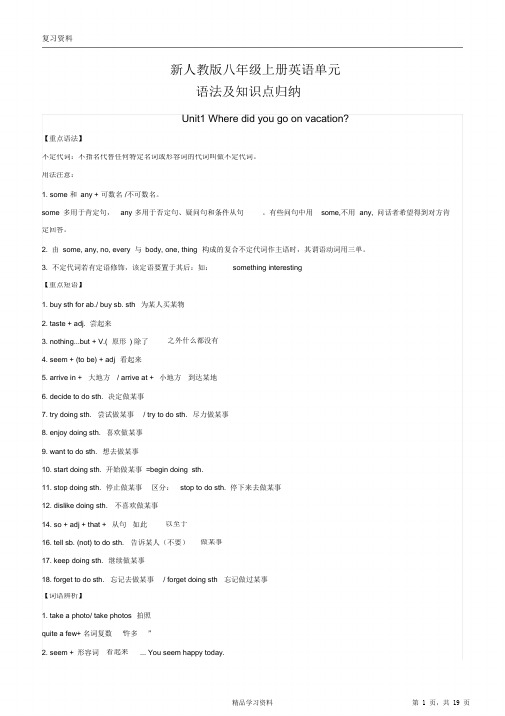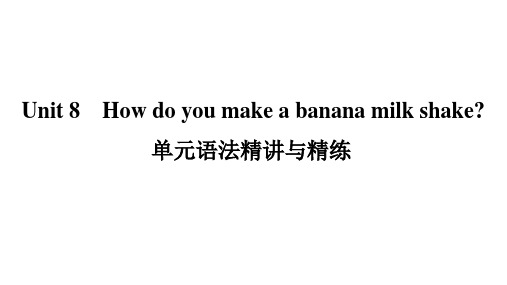人教版八年级英语上册单元语法精讲简练全套
- 格式:doc
- 大小:324.00 KB
- 文档页数:19

新人教版八年级上册英语单元语法及知识点归纳Unit1 Where did you go on vacation?【重点语法】不定代词:不指名代替任何特定名词或形容词的代词叫做不定代词。
用法注意:1. some 和any +可数名/不可数名。
some 多用于肯定句,any多用于否定句、疑问句和条件从句。
有些问句中用some,不用any, 问话者希望得到对方肯定回答。
2. 由some, any, no, every 与body, one, thing构成的复合不定代词作主语时,其谓语动词用三单。
3. 不定代词若有定语修饰,该定语要置于其后:如:something interesting【重点短语】1. buy sth for ab./ buy sb. sth 为某人买某物2. taste + adj. 尝起来……3. nothing...but + V.(原形) 除了……之外什么都没有4. seem + (to be) + adj 看起来5. arrive in + 大地方/ arrive at + 小地方到达某地6. decide to do sth. 决定做某事7. try doing sth. 尝试做某事/ try to do sth. 尽力做某事8. enjoy doing sth. 喜欢做某事9. want to do sth. 想去做某事10. start doing sth. 开始做某事=begin doing sth.11. stop doing sth. 停止做某事区分:stop to do sth. 停下来去做某事12. dislike doing sth. 不喜欢做某事14. so + adj + that + 从句如此……以至于……16. tell sb. (not) to do sth. 告诉某人(不要)做某事17. keep doing sth. 继续做某事18. forget to do sth. 忘记去做某事/ forget doing sth 忘记做过某事【词语辨析】1. take a photo/ take photos 拍照quite a few+名词复数“许多…”2. seem + 形容词看起来…... You seem happy today.seem + to do sth. 似乎/好像做某事I seem to have a coldIt seems + 从句似乎..…. It seems that no one believe you.seem like ... 好像,似乎….. It seems like a good idea.3. arrive in +大地点= get to= reach+地点名“到达......”arrive at +小地点(注:若后跟地点副词here/there/home, 介词需省略,如:arrive here; get home)4. feel like sth 感觉像…feel doing sth. 想要做某事5. wonder(想知道)+疑问词(who, what, why)引导的从句。


新人教版八年级上册英语单元语法及知识点归纳Unit1 Where did you go on vacation?【重点语法】不定代词:不指名代替任何特定名词或形容词的代词叫做不定代词。
用法注意:1. some 和any + 可数名/不可数名。
some 多用于肯定句,any 多用于否定句、疑问句和条件从句。
有些问句中用some,不用any, 问话者希望得到对方肯定回答。
2. 由some, any, no, every 与body, one, thing 构成的复合不定代词作主语时,其谓语动词用三单。
3. 不定代词若有定语修饰,该定语要置于其后:如:something interesting【重点短语】1. buy sth for ab./ buy sb. sth 为某人买某物2. taste + adj. 尝起来3. nothing...but + V.( 原形) 除了之外什么都没有4. seem + (to be) + adj 看起来/ arrive at +5. arrive in + 大地方小地方到达某地6. decide to do sth. 决定做某事7. try doing sth. 尝试做某事/ try to do sth. 尽力做某事8. enjoy doing sth. 喜欢做某事9. want to do sth. 想去做某事10. start doing sth. 开始做某事=begin doing sth.11. stop doing sth. 停止做某事区分:stop to do sth. 停下来去做某事12. dislike doing sth. 不喜欢做某事14. so + adj + that + 从句如此以至于16. tell sb. (not) to do sth. 告诉某人(不要)做某事17. keep doing sth. 继续做某事18. forget to do sth. 忘记去做某事/ forget doing sth 忘记做过某事【词语辨析】1. take a photo/ take photos 拍照quite a few+ 名词复数“许多”2. seem + 形容词看起来... You seem happy today.seem + to do sth. 似乎/好像做某事I seem to have a coldIt seems + 从句似乎.. . It seems that no one believe you.seem like ... 好像,似乎.. It seems like a good idea.3. arrive in + 大地点= get to= reach+ 地点名“到达...... ”arrive at + 小地点(注:若后跟地点副词here/there/home, 介词需省略,如:arrive here; get home)4. feel like sth 感觉像feel doing sth. 想要做某事5. wonder (想知道)+疑问词(who, what, why) 引导的从句。


人教版八年级英语上册Unit2语法规则精讲本文档将为您详细介绍人教版八年级英语上册Unit2的语法规则。
以下是各种语法规则的精要概述:一、一般现在时一般现在时表示经常性、惯性或客观事实。
它的基本形式是主语+动词原形。
例子:- I eat breakfast every day.- She goes to school by bus.二、一般过去时一般过去时表示在过去某个时间发生的动作或存在的状态。
它的基本形式是主语+动词过去式。
例子:- He played soccer yesterday.- They visited their grandparents last weekend.三、现在进行时现在进行时表示现在正在发生的动作。
它的基本形式是:be动词(am/is/are)+动词的现在分词。
例子:- They are watching a movie right now.- She is studying for her exam.四、过去进行时过去进行时表示过去某个时间正在进行的动作。
它的基本形式是:was/were + 动词的现在分词。
例子:- We were playing basketball at 5 p.m. yesterday.- He was sleeping when I called him.五、一般将来时一般将来时表示将来某个时间要发生的动作或存在的状态。
它的基本形式是:will/shall + 动词原形。
例子:- We will go shopping tomorrow.- She will attend the meeting next week.以上是人教版八年级英语上册Unit2的语法规则精讲。
希望对您有帮助!。

人教版英语八年级上册Unit 8 How do you make a bananamilk shake?单元语法讲解和练习Grammar语法讲解1.祈使句以下句子均为祈使句。
1.Go and wash your hands.(命令)2.Be quiet (please).(请求)3.(Please) Be kind to your sister.(劝告)4.Take a taxi, or you'll miss your class.(建议)5.Look out! Danger!(警告)6.Keep off the grass.(禁止)1.祈使句:基本结构(1)行为动词开头由“—动词原形+其他部分”构成,动词没有人称和时态的变化。
■Make a sentence with the word "peace”.■Have a great time.(2)动词Be开头由”Be+其他部分(形容词、名词或介词短语等广构成。
Be careful when crossing the street.(3)Let开头由“Let+宾语+动词原形+其他部分”(动作执行不包含听话者) 或"Let's+动词原形+其他部分”(动作执行包含听话者在内)构成。
■Let him go back now.Let us try again.(不含听话者)让我们再试一下吧。
■Let's try again.咱们再试一下吧。
祈使句:否定形式(1)行为动词和be开头的祈使句的否定形式为在句首加Never或Don't■Never/Don!t say that again!■Never/Don^ be careless. o(2)Let开头的祈使句■Don't let me go with her tomorrow.=■Let me not go with her tomorrow.可在Let前加Dont,也可在Let后宾格的名词或代词后面加note如果以Let's开头的祈使句,必须在Let's后加not。
人教版英语八年级上册全册十单元语法总结Unit 1 Where did you go on vacation?一复合不定代词1、用法复合不定代词相当于名词, 在句中可以用作主语、宾语和表语。
Someone is knocking at the door.I don’t have anything to say today.Money isn’t everything.复合不定代词被形容词、动词不定式修饰时, 形容词和动词不定式后置。
I have something important to tell you.There is nothing wrong with the radio.复合不定代词做主语时, 表示单数概念, 谓语动词用单词形式。
Everything begins to grow in spring.(1)some-不定代词用在肯定句中或者表示请求的一般疑问句中;any-不定代词多用于疑问句中否定句中。
Will you ask someone to carry the box for me?Would you like something to drink?anyone和anything也可以用在肯定句中, 表示“任何人”和“任何事”。
Anyone can do it.I can do anything for you.二一般过去时的规则动词和不规则动词(一)规则变化构成规则:在动词末尾直接加-ed .例如, work -worked , look -looked , play –played以不发音的字母e结尾的动词, 直接加-d .例如, live –lived , hope –hoped , use –used以辅音字母+y结尾的, 变y为i再加-ed .例如, study –studied , carry –carried , worry –worried以重读闭音节结尾且末尾只有一个辅音字母的,双写最后的辅音字母,再加-ed .例如,stop –stopped , plan–planned(二)不规则变化1.没有变化, 即: 与动词原形一样。
八年级上册英语基础语法综合讲解八上语法复习Unit1-Unit3一般现在时:表示现阶段的动作或状态一般现在时表示现在的状态,如:He is 12. She is at home.表示现阶段经常的或习惯性的动作,如:I go to school at 7:30 every day. 客观真理:The sun rises from the east.在一般现在时中,主语是第三人称且是单数时,动词用现三单形式:动词现三单变化规则动词原形第三人称单数形式一般动词在词尾加-s,在清辅音后读/s/,在浊辅音或元音后读/z/,在t后读/ts/,在d后读/ds/。
helplikeswimlistenknowplaygetfindhelps /helps/likes /laiks/swims /wimz/listens /?lis?nz/knows /n??z/plays /pleiz/gets /gets/finds /faindz/以字母s, x, sh, ch结尾的动词加-es, 读/iz/。
如果动词原形词尾已有e,则加s。
以o结尾的动词也加-es,读/z/。
teachgoteachesgoes以辅音字母加y结尾的动词,先边y为i,再加-es,读/z/。
study studies2.少数不规则的要记:do-does,be-is,have-has一般过去时;英语动词过去式变化规则及不规则动词的过去式Past Events动词过去式规则动词原形过去式原形过去式呼叫 call called 行走 walk walked搬运 carry carried 观看 watch watched跟随 follow followed 相信 believe believed发生 happen happened 邀请 invite invited帮助 help helped 喜欢 like liked看 look looked 住 live lived玩 play played 爱 love loved展示 show showed 使用 use used听起来 sound sounded 尝试努力 try tried冲浪 surf surfed 担心 worry worried转动 turn turned 失败 fail failed等待 wait waited 拜访 visit visited[1]直接加d或者ede结尾的动词, 直接加d: smile--smiled; hope--hoped.[2] 双辅音结尾的情况: 直接加ed: helped; learned.[3]重读闭音节:一个元音+一个辅音结尾的情况:双写最后一个辅音字母加ed. stopped; planned; preferred(重读在fer前); admitted(重读在mit前); referred; deferred;[4] y结尾的情况:辅音+y结尾动词,y变i加ed: worried;studied.不规则动词原形过去式原形过去式是 am was 是 is was是 are were 知道 know knew买 buy bought 见到 meet met 会能够 can could 看见 see saw抓住 catch caught 睡觉 sleep slept 做 do did 拿着 take took挖 dig dug 穿 wear wore喝 drink drank 写 write wrote吃 eat ate 驾驶 drive drove寻找 find found 骑 ride rode给 give gave 让 let let去 go went 放 put put有 have had 读 read read不定代词和不定副词的用法:回顾:some和any(一些)1) some一般用于肯定句,any用于否定句和疑问句①我需要一些笔记本。
人教版八年级英语上册单元语法精讲精练全套Unit 1Where did you go on vacation?单元语法小专题(Grammar Focus)语法精讲复合不定代词不指明代替任何特定名词或形容词的代词叫做不定代词,如:some,any,much,many,both,few 等。
本单元主要学习some,any,every,no加上thing或one构成的复合不定代词的含义及其用法。
复合不定代词含义用法例句thing something 某事;某物肯定句I'd like something to eat. anything某事;某物否定句及疑问句Did you buy anything in thestore?任何东西(事物)肯定句You can take anythingyou like.everything 一切肯定句、疑问句及否定句Don't worry.EverythingisOK.nothing没有什么用于否定句中,相当于not anythingMr.Smith sai d nothingthen.one复合不定代词含义用法例句someone 某人肯定句Listen!Someone is singing.anyone某人否定句和疑问句Tom doesn'twant to help anyone.任何人肯定句Anyone can do that.everyone人人;大家肯定句、否定句及疑问句Everyone doesn't like this movie.no one没有人否定句No one went to the mountains yesterday.【温馨提示】(1)复合不定代词作主语时,谓语动词常用单数形式。
如:Everyone in the village is friendly.这个村子里的每个人都是友好的。
(2)复合不定代词若有定语(形容词或动词不定式)修饰时,定语要放在其后。
如:Let's do something interesting.让我们做一些有趣的事。
I'd like something to drink.我想要一些喝的东西。
(3)在表示请求、建议等的疑问句中,问话者希望得到肯定答复时,常用含有some的不定代词。
如:Would you like something to eat?你想要一些吃的东西吗?语法精练Ⅰ.用方框中所给的单词填空。
everyone,anything,nothing,something,anyone,everything1.The re isn't ________ new in the whi te box.2.Tina is doing well in the ne w school.There's ________ to worry about.3.Did you go to the farm with ________?4.________ in the room looks very tidy and clean.5.Come here!I have ________ important to tell you.6.—Can you cook eggs with tomatoes?—Yes,sure.________ can do it,because it is easy,I think.Ⅱ.从括号内选择正确的单词完成句子。
7.There ________(isn't/aren't) anything interesting in the book.8.No one ________(were/was) in front of the house.9.Did your cousin buy ________(nothing/anything) in the supermarket?10.Mar y didn't go to the post office with ________(anyone/someone) last Sunday morning. 11.The singer is ver y great.Everyone here ________(know/knows) her.Ⅲ.按要求完成下列句子,每空一词。
12.There is something interesting in the story.(改为否定句)There ________ ________ interesting in the story.There ________ ________ interesting in the story.13.Someone is reading in the classroom.(改为一般疑问句)________ ________ reading in the classroom?14.我妈妈不知道关于这件事的任何情况,因为没有人告诉她。
(汉译英)My mother knows ________ about it because ________ ________ told her.单元语法小专题(Grammar Focus)Ⅰ.1.anything2.nothing 3.anyone 4.Everything 5.something6.EveryoneⅡ.7.isn't8.was9.anything10.anyone11.knowsⅢ.12.isn't anything;is nothing13.Is anyone14.nothing;no oneUnit 2How often do you exercise?单元语法小专题(Grammar Focus)语法精讲频度副词1.频度副词的定义:表示动作或状态出现的频率的副词叫做频率或频度副词。
2.常见表示频率的副词有以下几个,它们的频率由高到低依次为:always 总是;一直;始终100%usually 通常;经常90% often 常常;经常70% sometimes 有时;不时40%hardly ever 几乎从不;很少;难得5%never 从不;决不0%3.频率副词在句中常位于be动词、助动词、情态动词之后,实义动词之前。
sometimes有时可位于句首或句末。
如:I am always busy with my work.我总是忙于我的工作。
Susan doesn't usually eat breakfast at school.苏姗在学校通常不吃早饭。
He sometimes gets up at 5:30.=Sometimes he gets up at 5:30.他有时5点30分起床。
4.表示频率的短语有:once/twice a week一周一次/两次,three times a day一天三次,every day/week/year每天/每星期/每年……【温馨提示】三次或三次以上一般用“基数词+times”来表示。
5.当对频度副词及表示事件发生频率的短语提问时,常用how often,意为“多久一次”。
如:—How often does Lisa go to the movies?丽萨多久看一次电影?—Never.从不。
6.频率副词或短语常与一般现在时连用。
如:I never eat meat.我从不吃肉。
Jim usually does his homework in the evening.吉姆通常晚上做作业。
Sally doesn't often watch TV at the weekend.沙丽周末不常看电视。
How often do you eat fruit?你多久吃一次水果?语法精练Ⅰ.从括号内选择正确的单词或短语完成句子。
1.My mother is very busy,so she ________(hardly/usually) goes shopping.2.We all like Jim,because he is kind and ________(never/always) helps others.3.I know vegetables are good for me,but I ________(often/hardly ever) eat them.4.Julie ________(usually/never) watches sports shows because she doesn't like sports at all.5.—________(How often/How soon) do you go to the movies?—Sometimes.Ⅱ.按要求完成下列句子,每空一词。
6.She washes clothes every Sunday.(改为否定句)She ________ ________ clothes every Sunday.7.Jack usually does his homework at school.(改为一般疑问句)________ Jack ________ ________ his homework at school?8.They go to the science club three times a week.(对画线部分提问)________ ________ ________ they go to the science club?9.Frank usually listens to music in the evening.(对画线部分提问)________ ________ Frank usually ________ in the evening?10.We have English lessons on Monday,Tuesday,Thursday and Friday.(改为同义句)We have English lessons ________ ________ a week.Ⅲ.根据汉语意思及所给提示,翻译下列句子。
11.夏天的下午我们通常在公园里玩。
(usually)________________________________________________________________________12.我妈妈上班从不迟到。
(never)________________________________________________________________________13.你经常在学校图书馆读书吗?(often)________________________________________________________________________14.不要总是待在家里看电视。